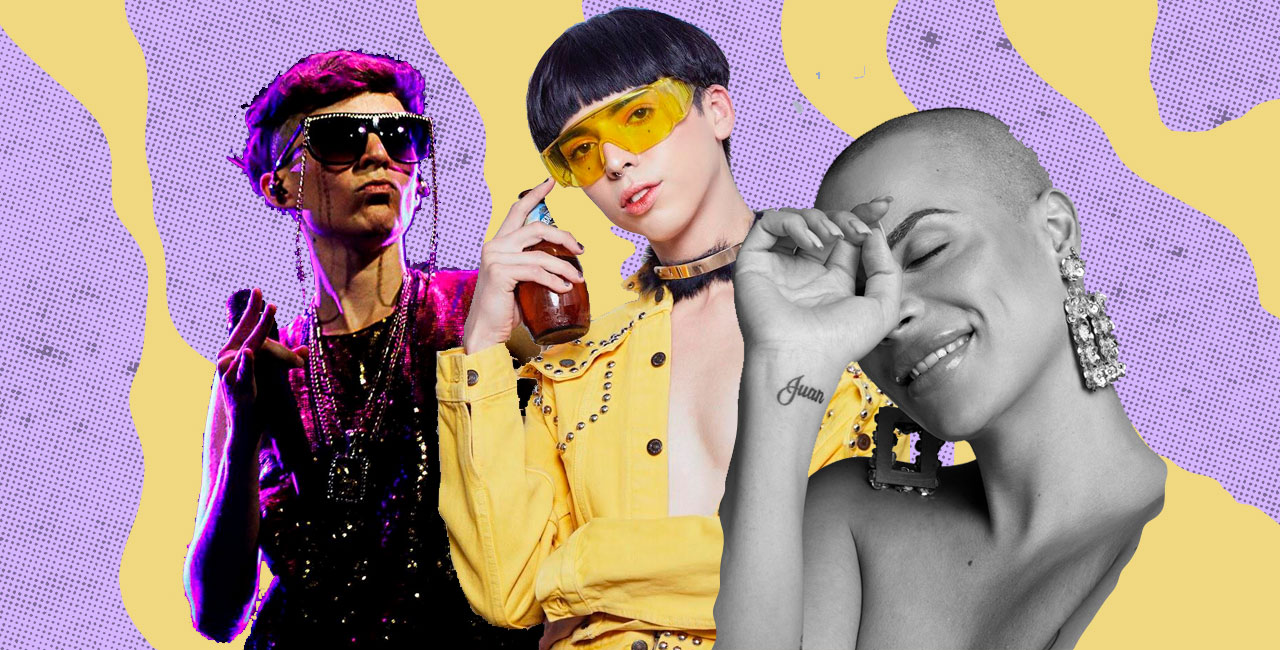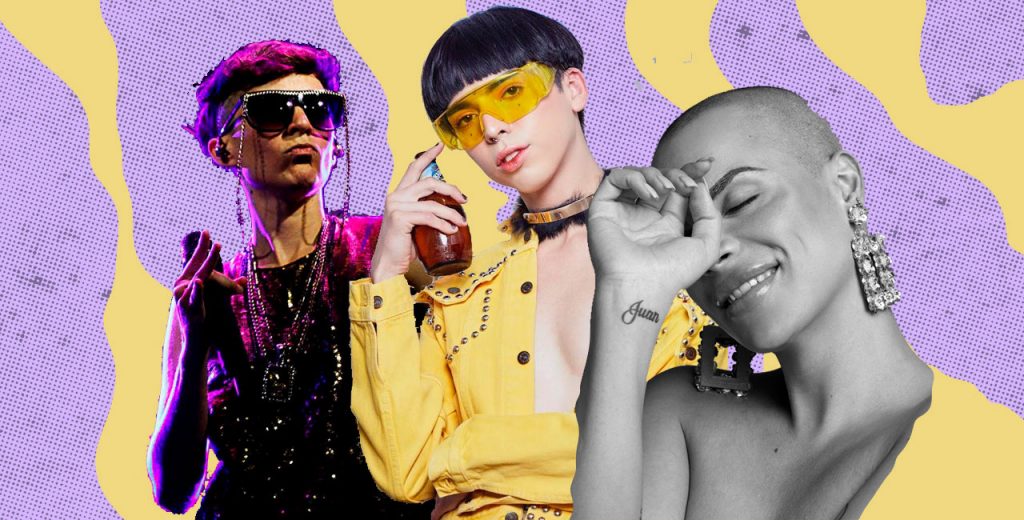Nearly two weeks after the murder of Puerto Rican trap artist Kevin Fret, details surrounding the 24-year-old’s tragic death remain vague and unsettling. Puerto Rican news outlet El Vocero reported that the murder has been linked to recurring threats and possible extortion, though police investigators have not yet ruled out the possibility of a hate crime. The murder underscores rising violence in Puerto Rico amidst the island’s ongoing economic crisis – a concern for locals that even led Bad Bunny and Residente to pay Governor Ricardo Rosselló a late-night visit to demand better education funding as a means to reduce violent crime.
As Latin trap’s first openly gay standard bearer, Fret once again ignited debate over the space queer and trans people hold within the urbano movement. He was a frequent critic of the internalized homophobia displayed by many of his peers, making his death a bitter reminder of why greater visibility for queer artists is an important step towards addressing gender and sexuality-based discrimination within the music industry.
Fans and artists regularly challenge the myth that reggaeton and dembow are inherently homophobic and misogynistic, though these symptoms are undeniably ingrained in our society through normalized slurs and glaring double standards. Bad Bunny, J Balvin, and others are routinely praised for defying gender norms by embracing off-the-wall fashion and colored hair and nails – a low bar to clear on the scale of gender transgression. Queer artists are seldom afforded such freedom of self-expression without being immediately pegged as campy gimmicks or pelted with marketability concerns from industry brass.
Underground movements like neoperreo and the proliferation of independent music distribution platforms have created alternate avenues for women and LGBTQ artists looking to avoid the industry’s more stifling trappings. However, pressure to emulate the bravado and toxic masculinity of some of urbano’s biggest names remains an alluring path to gaining wider acceptance where such expectations are the norm.
Bearing that in mind, we’ve compiled a list of queer and trans artists paving their own uncompromising paths within reggaeton and dembow. Every artist on this list is an expert at fanning the flames of dance floor ecstasy, but their work is also making perreo a more inclusive experience for all to enjoy.
1
Sailorfag
Sailorfag was one of the breakout stars of 2018, thanks to a series of acerbic singles and highly stylized videos that hilariously unpacked themes of toxic masculinity and self-destructive relationship drama. After dropping his self-titled debut mixtape over the summer, the Mexican internet phenom became a favorite of neoperreo fans taken with his unique blend of humor, unabashed jotería, and inclusive language, even receiving co-signs from the movement’s high priestesses Tomasa del Real and Ms Nina.
2
La Delfy
After bursting onto the scene in 2012 with her iconic feature on Jhon Distrito’s “Dame Leche” and subsequent mixtape La Más Perra, La Delfy became one of the most notable queer figures in the Dominican Republic’s vibrant dembow landscape. Though her spotlight seemed to dim in recent years, the fierce dembow diva had a roaring comeback in 2018 with exuberant features on La Materialista’s “Cocoro” remix and Jhon Distrito’s “Que Rico Todo.”
3
DJ Guapis
DJ Guapis has become one of Mexico City’s go-to reggaeton pied pipers, stirring crowds into sweaty perreo frenzies while actively promoting the safety, comfort, and visibility of trans and gender-nonconforming partygoers. Her commitment to creating safe spaces started with artsy reggaeton rave Perrealismo, and most recently manifested with her new party TRNSX, which enlisted DJ Gatorade for a night of dance floor bedlam organized by and for Mexico’s trans community.
4
MANCANDY
In 2016, Mexican fashion designer Andrés Jiménez turned heads when he decided to take on the name of his established streetwear label, MANCANDY, as the moniker for his new reggaeton persona. Despite skepticism from his fashion industry peers, MANCANDY has dropped numerous pop-reggaeton bangers with videos that showcase his stylish designs, also scoring exciting collaborations with Tomasa del Real and Mexican urbano wunderkind BrunOG along the way.
5
King Jedet
Making a splash alongside Ms. Nina in femme empowerment anthem “Reinas,” King Jedet boldly introduced themselves to the world by spitting, “Soy un tío con vestido” over the song’s shimmering reggaeton beat. The Spanish rapper flows indiscriminately between pronouns and gender presentations, translating this abstract fluidity into their debut mixtape La Leona, where reggaeton, trap, and flamenco influences swirl into delicious pop-perreo and some surprisingly emo cuts.
6
Chocolate Remix
Argentine firebrand Chocolate Remix is colliding politics and sexual liberation into what she has branded “lesbian reggaeton,” putting a distinctly feminist twist on her raunchy and ferociously subversive productions. Standouts from her project Sátira include “Ni Una Menos,” where she fearlessly unpacks misogyny and domestic abuse, then takes a 180-degree turn on cheeky banger, “Como A Mí Me Gusta,” professing her love for women of all body types and walks of life through devilishly bawdy wordplay.
Responding to critics who argue she has fallen into the same objectifying trappings as men, Chocolate Remix fervently maintains the women in her songs and videos are much more than accessories, celebrating instead the independence and sexual freedom women are too often denied by a patriarchal society.
7
Solomon Ray
Veering from the R&B and hip-hop roots of his early career, Solomon Ray has taken the last two years to recast himself as a reggaeton romántico dreamboat making a passionate play for the big leagues. Singles like “El Otro” and “Over You” lean directly into Ray’s mainstream ambitions, singing of loss and heartbreak over glossy pop production, while the sexy playfulness of “Así Así” practically dares industry naysayers to underestimate his raw potential. Word to the wise: Don’t sleep on Solomon Ray.
8
Shakatah Astoa
Based in Bonao, Dominican Republic, Shakatah Astoa’s viral chapiadora anthems made her one of our favorite dembow breakouts of 2018. “La real mujer moderna,” as she describes herself, gained a major following with tracks like “El Amor No Compra” and “Bastelo,” winning over fans with an unapologetic love of money and high-glam femme aesthetics.
9
DJ Travieza
DJ Travieza’s work with Mexico City’s Mami Slut collective helped pave the way for the rise of gender-rebellious urbano parties that have taken over much of Mexican nightlife. At these perreo free-for-alls, gender is little more than a rapidly dissipating illusion. The illustrator-turned-DJ identifies as non-binary, and their sets are exploratory sonic journeys that dip into reggaeton and ballroom while firmly rooted in disruptive intention and sweaty dance floor transcendence.
10
Cultura
Cuban-American reggaetonera Cultura is determined to change the overwhelmingly male landscape of urbano music and she is drawing inspiration from game-changing reinas like Ivy Queen, as well as the soundtrack of her childhood upbringing in Miami. Tracks like “Mamacita” and “No Tengo Más” are perfect for hot and heavy late-night grinding, exuding a certain beachside ease that speaks directly to Cultura’s Caribbean background.
11
Ar Kedabar
Ar Kedabar has been making the rounds in Miami performance circles for years, best known for her mighty dance skills, as well as her inspirational online presence across YouTube and Instagram. A relative newcomer to music, the Peruvian-American artist dropped “Chill Chica” last summer, a track proving she definitely has the chops and confidence to make it as a vocalist in Miami’s buzzing urbano scene.




